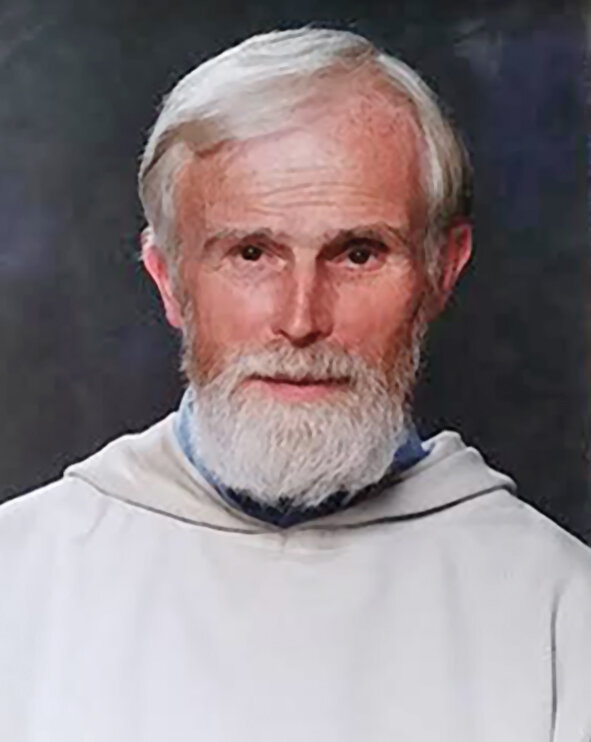Bruno Barnhart
An extraordinary and life-changing spiritual experience when he was a young man shaped the rest of Bruno Barnhart’s life. It led the Californian Camaldolese Benedictine Monk, who died in 2015, to devote his life’s work to recovering and re-conceiving Christian wisdom today, centred on and emanating from the one great revolutionary event of the Cross. Dr Chris Morris, who completed a PhD* on Barnhart in 2020, explains why he has found Barnhart’s ideas “compelling and endlessly engaging”.
While working in a chemical laboratory at the age of 27, an accident led Bruno Barnhart to losing the sight in one eye. He describes how in the terrifying period of waiting in a hospital room to have his eye extracted, he suddenly had an experience of:
… light … an experience of being taken up and let down … where you are sort of lifted into God and you come back down full of love … when that happened to me everything was just full of glory, love or peace – the words don’t quite work … but it is the kind of experience that when it happens to you, you can never forget it and you can never deny it … it was an experience of God.
This experience confirmed his monastic vocation and in 1959 he entered New Camaldoli Benedictine Hermitage in Big Sur California. The world of “wisdom” opened-up and became central to his life. In this reflection I describe three of what I believe are his great contributions:
Firstly, his conception of wisdom as a way of experiential or “participatory” knowing. Wisdom is to know with the whole of the person – bodily, imaginatively, intuitively – and to know “from the inside” where “you and what you are looking at penetrate one another”.
This participatory knowing can be contrasted with purely objective knowing, to know something by “standing outside and looking at it,” by separating the subject from the object. Barnhart illustrates using the images of taste: “taste says it best … what you taste you are taking into yourself, you are absorbing, it is becoming you … [wisdom] gives you a taste and at the same time it is tasting you, it is somehow assimilating you.”
This gives the person a great sense of “affirmation” and vitality – it’s both “participatory and also in movement”. It occurs in those moments of connection, often in nature, and reveals something of the essence of the human person.
Secondly, Barnhart gives a transformative meaning to Christian wisdom in this participatory context. The Christian mystery is a “participatory event … and revolution,” a flashpoint radiating outwardly and impacting everything in its wake - releasing “total participation” for humanity both vertically (with and in God) and horizontally (with each other and ultimately the cosmos).
This “shape”, with its vertical and horizontal axes, is established as “the wisdom of the cross” and this becomes the transformative key for the Christian mystery: it is “one great event of transformation” leading to the “transformation of consciousness … of society” and therefore “of the whole of human life”.
Finally, Barnhart provides the big picture and develops a Christian wisdom in a global context. Here he reflects on the meaning of history and develops a dynamic of four key turns:
A “sapiential (wisdom) awakening”: the foundational turn, recovering the basic perspective of Christian wisdom today in participatory terms after a long hiatus in western Christianity.
An “eastern turn”: re-centring Christianity in a radically unitive perspective in terms of nonduality.
A “western turn”: integrating the creative element of Christianity especially expressed in the new realisation of the human person in western history.
A “global turn”: our active participation in the growth toward one world.
I believe Barnhart opens doors into spiritual practice, old and new, and provides a framework to integrate the diverse movements of history – particularly in our time.
The largeness of his vision allows him to embrace “strange, new regions which we may not immediately recognise as belonging to Christ” and at the same time be critical of aspects of spirituality, especially those that take an ambivalent attitude towards life in the world. Barnhart’s vision is fiercely incarnational and invites all into its transformative dynamic:
Jesus brings an essential newness … a flame that’s contagious … a revolution from law to freedom … an expansive transforming energy … within the human person and moving outward into the world.
Dr Chris Morris is a lecturer at Catholic Theological College, Melbourne, Australia, in the area of Spirituality. He teaches units in Christian Spirituality and in the Graduate Certificate in Teaching Meditation.
*His thesis, The cross now rooted breaks in bloom: A study of Bruno Barnhart’s wisdom knowing and wholeness in Christian life, is available at:
https://repository.divinity.edu.au/4084/1/CMorrisPhD2020.pdf
Barnhart’s Books:
Barnhart, Bruno. The Good Wine: Reading John from the Centre. Eugene: Wipf and Stock Publishers, 1993.
________. Second Simplicity: the inner shape of Christianity. New York: Paulist Press, 1999.
________. The Future of Wisdom: Toward a Rebirth of Sapiential Christianity. New York: Monkfish Book Publishing Company, 2018.
Films available on YouTube: Search “Bruno Barnhart Wisdom”
See:https://www.youtube.com/watch?v=sOggTIYbs6M&list=PL6PE0vluT3fJ8MlZV7cjE-sZQ99qwCyqj&index=1
